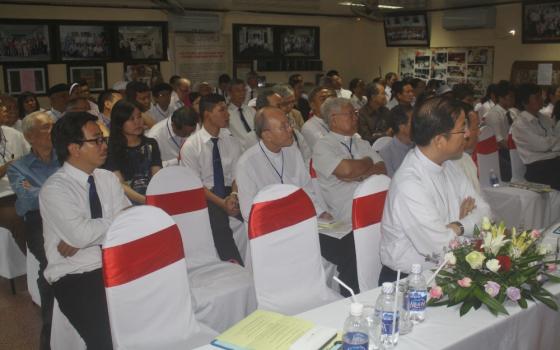Editor’s Note: Prominent Catholic leaders gathered earlier this summer in Ho Chi Minh City* to commemorate a key turning point in church-state relations, the issuing of a Vietnamese bishops’ conference pastoral letter in 1980 that ushered in détente between the antagonistic parties.
That letter, crafted by the late archbishop of then-Saigon (now Ho Chi Minh City), called for unprecedented cooperation in efforts to rebuild the war-torn nation and has served as a guideline for church pastoral activities for the past 35 years.
The gathering June 26 was organized by the Vietnamese Catholic Weekly, Cong Giao va Dan Toc (Catholicism and Nation), and the Institute for Religious Studies in Vietnam.
The following is a translation from Vietnamese of a frank report delivered by one the conference participants, Franciscan Missionaries of Mary Sr. Elizabeth Tran Thi Quynh Giao, former provincial superior in Vietnam. Her brave report looks back in time and also looks forward, challenging Vietnamese government officials to allow more freedom to the Catholic church in Vietnam in order that it better serve the people and better build the nation.
______
The Vietnamese bishops’ 1980 joint letter called on religious to get involved in social activities, not only to secure a means of their livelihood but also to give witness to God. The document raised religious’ spirits so they could find peace of mind working with government officials on the basis of human dignity and social justice.
People at the time found that sisters were approachable, friendly and kind persons and could answer questions such as, “Why did you become a nun?” or, “The country needs skillful and generous women like you. Why don’t you get married?”
We sisters took those opportunities to explain the ideals of consecrated life to those who asked, trying to lead them to the God of love through our daily life and activities. We were also touched by peoples’ positive responses because many had never heard about God.
Sisters bore witness to the Good News by living in hope and peace and by serving the needy. In doing so, they performed their prophetic duties — interpreting God’s word through their actions during that time.
Earlier teachings of Vatican II (1962-1965) permeated widely among Catholics in southern Vietnam and profoundly influenced religious’ acts and thoughts. Vatican II emphasized that human beings should be at the center of all economic, political and social activities. Social injustice, the Vatican II documents taught, needed to be uprooted from society so that people could live in dignity and in harmony with one another.
The documents also taught that religious needed to live out the Gospels by staying as close to the poor as possible, by establishing close ties with nonbelievers and followers of other faiths, and by helping to improve health care, education and social services.
In the early 1980s, some women religious congregations began efforts to provide free basic education for children from poor families, despite roadblocks at times set up by local government officials. It took efforts to convince government authorities to approve these new services. Gradually these teaching efforts became legal.
As the years followed, more women religious congregations got involved and established government-approved education programs, many aimed at helping the very poor.
Today, daycare centers run by congregations are highly valued by the government authorities, who show their trust by sending their own children to these Catholic centers.
Although the church is still officially banned from offering health care or setting up private schools, Catholic nuns strive to work hard at public hospitals and teach in universities as staff members. Congregations have also opened health clinics, offering free treatment to poor patients who cannot afford hospital care. Nuns and other Catholic health workers volunteer to give medical care to people in remote areas on a regular basis.
Sisters and Catholic laypeople today quietly look after and provide health care to many abandoned people who live with the HIV/AIDS virus. Sisters and priests have been invited by government officials to work in the AIDS wards at hospitals, places that often do not attract adequate medical staff. It is here the women religious offer patients dignity as they live out their last days.
Other women religious congregations today in Vietnam teach vocational skills to the young, assist domestic migrant workers and people with physical disabilities, and give refuge to orphans, the elderly, and women with unwanted pregnancies.
Vietnam today has 13,500 women religious who are living out their missions, sacrificing to bring hope, peace and abundant life to others, especially the lost young who are running after material gains and losing their directions in life.
The local Vietnamese church has experienced its ups and downs over the years, cooperating with authorities as it can, serving the nation and its people as it can during the past four decades.
The 1980 bishops’ conference pastoral letter’s spirit still echoes among Vietnamese Catholics today. Vietnam is turning the page, and it is time for nuns to be invited to reach out to people at new peripheries.
I believe that women religious can go forth in new ways to answer the call of Pope Francis, who calls on Christians to dare go forth and reach all those at the peripheries, and to serve as bridges, to meet, to love, to forgive and to sympathize with those who are abandoned and excluded.
Women religious congregations now need to draw up new action plans for increased pastoral work in order to meet needs of people in remote areas where there is still little Catholic presence.
Government authorities need to become more interested in the socially disadvantaged and to create better conditions for religious congregations to respond to the needs of the people as the country grows. If not, both religious congregations and the nation will wither away, and those in positions of government authority will be reproached by the young, who are thirsty to build a great nation.
I still remember that when Archbishop Paul Nguyen Van Binh was alive, he said he once feared communists but had learned to address those fears.
He came to realize the government and church needed to work together to build the nation and that meant knowing how to dialogue, settle conflicts and support one another.
For the benefit of the people and country, government officials today should leave aside their own interests and cooperate with the Catholic church, whose nuns are ready to serve people to improve their material and spiritual life and to develop the country as well. In doing so, both nation and church can fulfill their obligations. This mission requires heavy responsibility and cooperation by both sides. It requires trust. Should this trust grow, the rewards will follow and the people will commend their efforts.
*An earlier version of this report gave the incorrect city.
[Franciscan Missionaries of Mary Sr. Elizabeth Tran Thi Quynh Giao is former provincial superior in Vietnam.]


